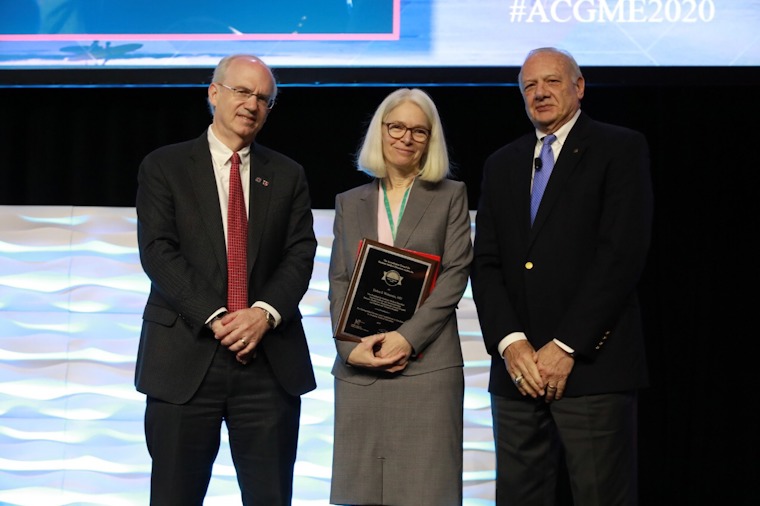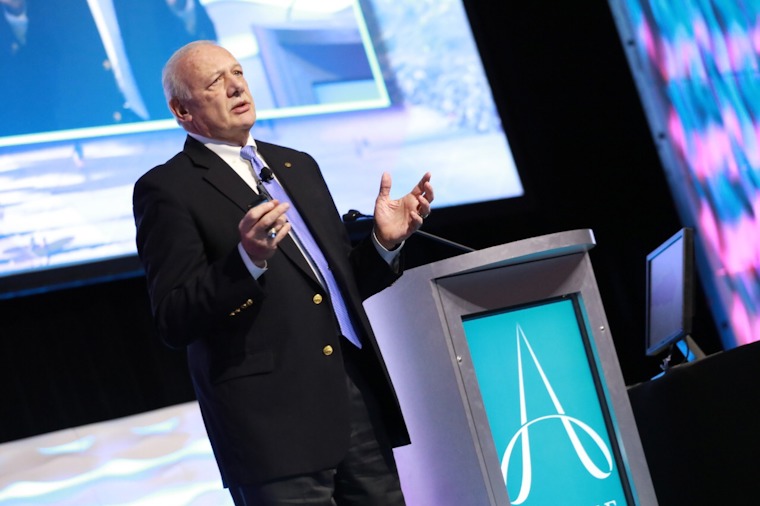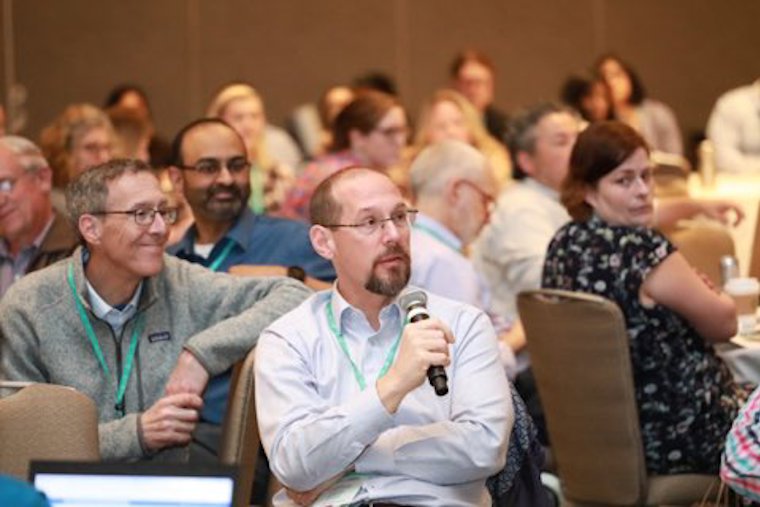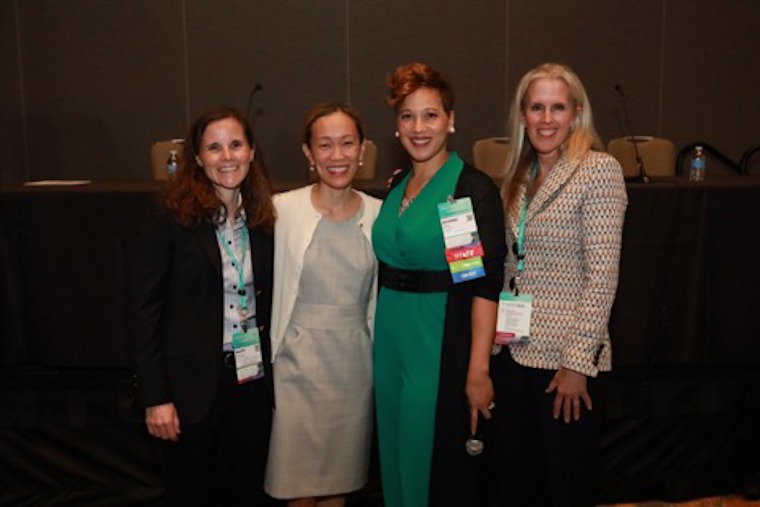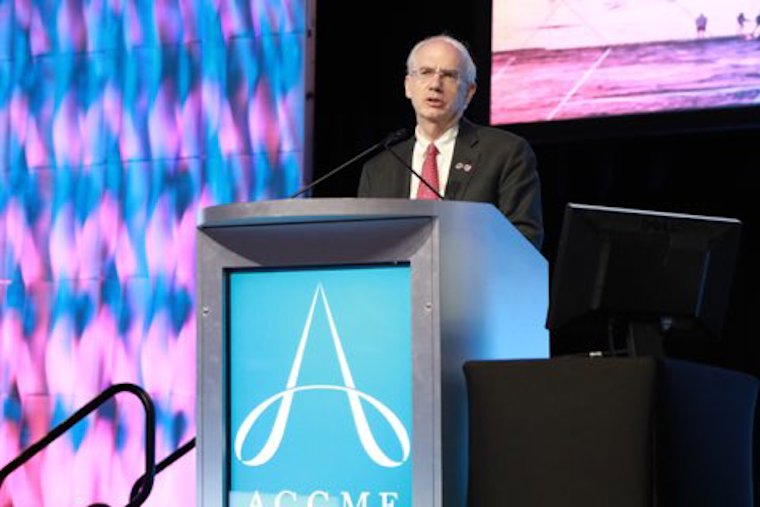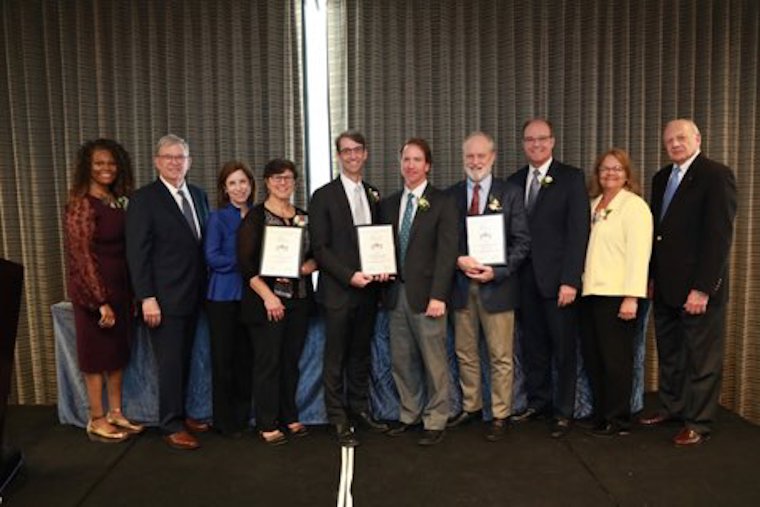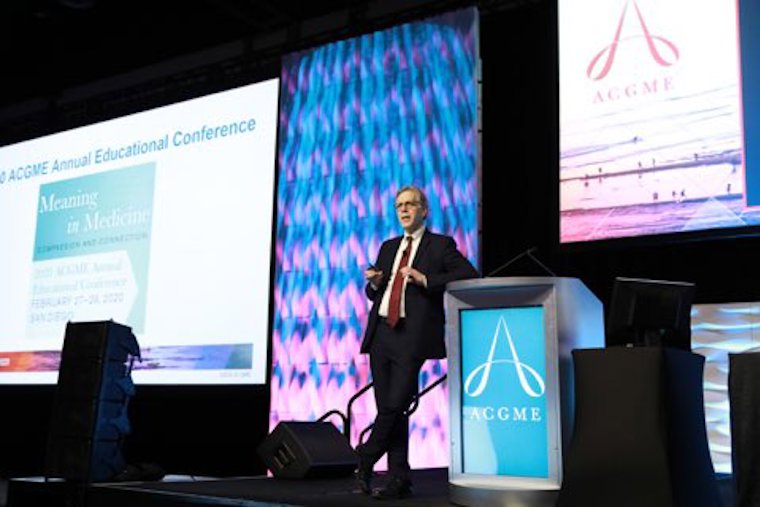ACGME Chief of Staff and Chief Education and Organizational Development Officer Timothy P. Brigham, MDiv, PhD kicked off the first full day of the Annual Educational Conference with a warm welcome, and acknowledged that today is Thank a Resident Day, asking the residents and fellows in the room to stand up, and all attendees to thank and acknowledge them. He also announced the creation of the ACGME’s Diversity and Inclusion Award, which will be given at the 2021 ACGME Annual Educational Conference.
ACGME Board Chair Jeffrey P. Gold, MD, bittersweetly acknowledged this as his last ACGME conference as Chair, and spoke warmly about the Board, the ACGME staff, and the important role of graduate medical education in the management of COVID-19. He then presented the 2020 John C. Gienapp Award to Debra F. Weinstein, MD of Partners Healthcare, and introduced ACGME President and Chief Executive Officer Thomas J. Nasca, MD, MACP to deliver the President's Plenary.
Dr. Nasca discussed the ACGME’s evolution from a loose grouping of Review Committees to a graduate medical education community and accreditation framework nimble enough to prepare residents and fellows to be ready to respond to the rapidly changing health care environment. Today’s residents and fellows, he said, will still be practicing medicine in 2060.
“We need to prepare them to be ready to master that change and embrace that change for the good of the patients they will serve,” Dr. Nasca said.
That includes giving residents and fellows the skills and tools to provide appropriate care in the context of their communities while focusing on social determinants of health and integrating these educational aspects into the clinical learning environment. “We are driven by what we believe is the continued evolution of the social contract—all of us raised our hand and made a promise.”
Four large, well-attended plenary sessions featured discussions of social issues framed in the context of graduate medical education and medicine writ large: racial diversity; the opioid crisis; gender harassment and inequality; and physician well-being.
Owen Garrick, MD, MBA offered empirical evidence for the value of diversity in health care to a highly engaged audience in his plenary entitled “Does Diversity Matter for Health? Beyond a Moral Obligation—Experimental Evidence.” There is a strong body of proof that black men are more willing to engage in preventive health care when talking to a black doctor, Dr. Garrick said. In communities of color, he added, preventive care is not sought because of a lack of trust in the health care system, he added. A third of his presentation was dedicated to a robust question-and-answer session, during which attendees asked about ways to collaborate with Dr. Garrick on his work and had a lively discussion on how to recruit more minority physicians.
During the “Confronting the Opioid Crisis: Preparing the GME Community to Meet the Challenge” plenary, a panel of speakers discussed the opioid crisis, examining the crisis through three lenses: the lived experience, the science of addiction, and the experience of a program director who has integrated substance use disorder education into her program.
In July 2019, the ACGME Common Program Requirement began requiring programs to “provide instruction and experience in pain management if applicable for the specialty including recognition of the signs of addiction.” (IV.C.2.)
Bioethicist Travis N. Rieder, PhD was prescribed opioids following a devastating motorcycle accident, but once given the medication, was given no plan to stop taking them. He tapered off the drugs in an extremely dangerous way that left him in opioid withdrawal for 29 days. “My doctors were nowhere, they gave up,” he said. “Every moment of opioid withdrawal was the worst moment of my life.”
Wilson M. Compton, MD, the deputy director of the National Institute on Drug Abuse, explained how addiction works in the brain and that it is a process that cannot be treated overnight. “It takes time for addiction to set in; it takes time for addiction to resolve,” he said. He also listed medications available and being developed that can help those with addiction manage their symptoms.
Diana Coffa, MD associate professor at University of California San Francisco/San Francisco General Hospital, gave advice on how to set up a program to educate residents and fellows on prescribing opioids and recognizing addiction in patients. All physicians, no matter the specialty, she said, should know how to screen for and diagnose substance use disorder, recognize the range of treatment options, and be able to refer patients to treatment. The curriculum should also include a section where residents and fellows identify personal bias around this issue and develop more inclusive language that mitigates the stigma of addiction.
Esther Choo, MD, MPH, a founding member and strategic lead for TIME’S UP Healthcare, challenged the industry standard with statistics and a reality check in her plenary, Time’s Up Healthcare: Envisioning our Future Workforce. Sexual harassment and discrimination are common in academic medical settings, and have a profound impact on work and well-being, and the #MeToo Movement pushed this reality onto an international stage in an unprecedented way. Women in medicine responded immediately, and with deep empathy. The Time’s Up Legal Defense Fund was formed, and from there, industry-specific “verticals” that included the Healthcare group Dr. Choo helped to found.
Dr. Choo described the organizational factors that allow harassment to occur, and identified frameworks for changing health care’s approach to harassment and inequities of all kinds, and for developing strategies for building a workplace and educational environment that reflects the honorable values of the field with equity and parity. Dr. Choo noted that 20 percent of females experience sexual harassment during training, with a profound impact that even changes many women’s professional paths.
But it wasn’t just about harassment. Discrimination inequality are as pervasive in the medical field as anywhere else. As of 2018, said Dr. Choo, there was no specialty in which women earned more than men. She shared statistics on the business case for diversity as well, noting that diversity is actually shown to correlate to better financial performance, and proposed a logical framework for addressing workforce equity and safety that simply asks for formal structure and process to result in successful outcomes.
At her plenary, National Academies: Report to Improve Patient Care by Supporting Clinician Well-Being, Lotte Dyrbye, MD, MHPE, a member of the ad hoc committee of the National Academies of Sciences, Engineering, and Medicine that examined scientific evidence regarding the causes and consequences of clinician burnout, discussed the committee’s report as well as potential mitigating strategies. The result of a call to action by the National Academy of Medicine, ACGME, and Association of American Medical Colleges, along with a commitment by hundreds of other organizations, to address clinician well-being and resilience, the Committee on Systems Approaches to Improve Patient Care by Supporting Clinician Well-Being’s report was released in the fall of 2018. Dr. Dyrbye, who is Professor of Medicine and Director of Faculty Development at Mayo Clinic School of Graduate Medical Education, was one of the report’s co-authors.
She addressed the conceptual framework for the report, noting multiple factors that impact the clinical learning environment and clinician burnout, as well as the committee’s recommendations, including for system-level changes to support the professional well-being of all clinicians. Dr. Dyrbye summarized a well-being culture that supports change management, psychological safety, vulnerability, and peer support, and in which organizational structures and processes align with organizational and workforce values.
The bad news, Dr. Dyrbye said, is that there is no quick fix and no single solution. But the good news is that commitment from leadership is providing infrastructure, resources, and accountability, to improve the culture overall. Taking action against clinician burnout requires that various work system factors be targeted and that everyone leans in.
Afternoon sessions included: a resident/fellow-led program on how to integrate leadership development into GME; how diversity and inclusion training can promote wellness; Review Committee updates by specialty; and how to use social media to engage in medical education (#MedEd), among others.
A luncheon reception honored the recipients of the 2020 ACGME Awards, the ACGME’s joint awards with the Gold Foundation and the New York Academy of Medicine, and the ACGME International's 2020 Awards. Also during lunch, conference attendees worked with non-profit organization Heal the World to pack toiletry kits to be distributed to the homeless community in San Diego.
Tonight, attendees can attend a yoga class to destress after a full day of sessions. There will also be a private reception for members of the ACGME and ACGME International’s global constituency, and another private reception for the Journal of Graduate Medical Education’s reviewers and editors.
We're looking forward to another empowering and inspiring day tomorrow!

